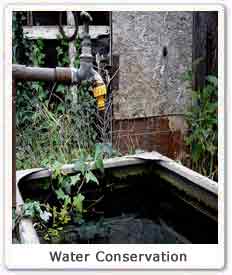 Tips
to save water :
Tips
to save water :- Avoid leakage of water from the taps.
- Turn the tap off when not in use especially when you brush your teeth or wash clothes.
- Rainwater harvesting is the another method to conserve water.
- The water supply should be limited in those areas which enjoys the unlimited water supplies.
- Check the leakage of water in the toilets. Also get check the hidden water leaks.
- Educate the mind of the people in the rural areas to save the water.
- Promote the conservation of water through media and wall posters.
- Never throw the water unnecessary on roads which can be used for gardening and cleaning.
- Avoid unnecessary flushing the toilets. Dispose off the tissues, cigarettes and other waste into the bin instead of toilets.
- Use minimum amount of water to bath.
- Water Waste restrictions.
- Improvement in the water distribution system.
- Water your lawn only when it is needed.
- Use a broom instead of hose to clean the sidewalks or to wash the car.
- Capture the water that is leaking and repair it as soon as possible.
- You can use washing machine to wash clothes that does not consume much water.
- Donot leave the tap running while washing the dishes in the kitchen.
- Install small shower heads to reduce the flow of water.
- If you save water it can save your money bills.
- Reduction in interior water use cuts waste water flows, especially overflowing of gutters which contaminates the environment.
- Environment benefits include eco system and habitat protection.
- Water conservation helps in improving the quality of your drinking water.
Rainwater Harvesting :
Rainwater harvesting is the gathering and collection of water from the rooftop. The traditional method of rain water harvesting is the most effective and simple way to conserve the water. It means utilization of rain water for the domestic as well as agricultural purposes. There are three technical methods of rain water harvesting such as Catchment, Conveyance and storage.
Historical Water Bodies :
There are many traditional water bodies which have been in disuse for the longer time. These bodies can be reused as the recharging points.
Ponds :
Steps should be taken to avoid dumping of sewage into the village ponds. Efforts need to be made to deepen these ponds with the dragline machines. Garbage and other waste sholud not be dumped into the ponds.






